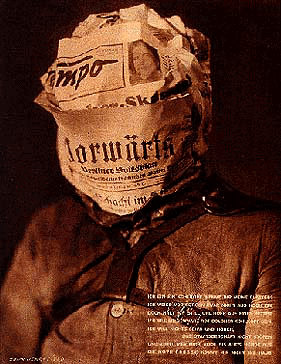
 |
| John Heartfield — 1930 |
| Wer Burgerblatter liest wird blind und taub. Weg mit den verdummungsbandagen! (Whoever reads bourgeois newspapers becomes blind and deaf. Away with the stultifying bandages!) |
Written language in its earliest form was an extremely significant breakthrough in technology. But despite the obvious advantages of literacy, it had its downside in that it promoted linear reasoning and human construction of actuality changed accordingly. "Literacy creates very much simpler kinds of people than those that develop in the complex web of ordinary tribal and oral societies."20
Walter Ong21 built on McLuhan's ideas and his own anthropological research into oral societies to explain the dramatic changes in society that came with literacy. Ong argues that the shift from oral to literate culture in about the fifth century BC did more than change patterns of art, politics and commerce. It enabled a profound change in human consciousness and brought about linear, abstract forms of Western logic taken for granted today but which were unthinkable without literacy as a means of preserving complicated original thought.22
In Understanding Media,23 McLuhan enlists the legend of the dragon's teeth as an allegory for the development of the alphabet and, at the same time, bodies of armed men. It was written orders that enabled empires to be administered from a remote centre such as Athens or Rome. "The citizen armies of Cromwell and Napoleon were the ideal manifestations of the new technology."24
If literacy created a schism between thought and action, this was further institution-alised by print in the creation of what McLuhan calls Gutenberg Man. "Print provided a vast new memory for past writings that made a personal memory inadequate."25 McLuhan makes the point that nationalism did not exist in Europe until the Renaissance,26 when typography enabled every literate person to see his or her own language analytically as a uniform entity. The printing press, by spreading mass-produced books and printed matter across Europe, turned the vernacular regional languages of the day into uniform closed systems of national languages and gave birth to the entire concept of nationalism.27
The extension of print media was integral to the development of the modern nation state. "If the phonetic alphabet fell like a bombshell on tribal man, the printing press hit him like a 100-megaton H-bomb,"28 and the development of print gave orthodoxy to the culture of the written word.
McLuhan announced that the information age, ushered in by the invention of the telegraph in 1844, reversed the course of history. "After three thousand years of explosion, by means of fragmentary and mechanical technologies, the Western world is imploding."29 By this he meant the hyperaccelerated, non-linear nature of electronic media was "demesmerizing" Western culture, snapping it out of the "typographic trance"30 into which the printing press had thrown it.